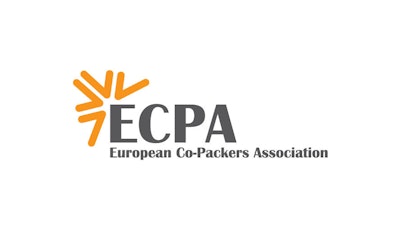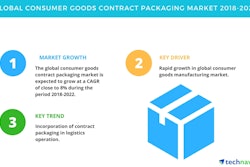
The co-packing market is on the rise in Europe, with 81% of co-packers demonstrating growth between 2016 and 2018, and 30% planning to invest in several packaging lines in the next three years. That’s according to the results of a market study from the European Co-Packers Association, which were presented at the association’s third conference in Eindhoven, the Netherlands.
Noted the association, The ECPA Market Report 2018 sketches a picture of a healthy, stable industry that has been less concerned with growth in the last few years, focusing more on margin improvement. “In our very first report in 2013, we were dealing with a shrinking economy, where competition was fierce and co-packers focused primarily on growth,” says Peter Nieuwkerk, Managing Director of Budelpack. “The market in 2018 is completely different. There is sufficient work for everyone, so that the focus has shifted to making more profit and recruiting good staff, which is scarce. In addition, we have to deal with increasing quality requirements from our clients.”
The report sees the increasing quality requirements as a threat to co-packers. However, Mark van der Burgt, Commercial Director at Vetipak, sees this as an opportunity. “Actually we have to embrace the quality audits and see them as an opportunity to prove that you meet the high standards. Sometimes it even happens that a customer learns from our working method. The problem is often that co-packers feel small and less powerful than their customers. This Calimero [complaining] behavior is not needed for anything. For example, we have been in discussion with Marks & Spencer for years. In the end we were able to convince them that some things can also be different than their quality rules prescribe. Co-packers should be much more equal in that regard.”
At the conference, Christian Mahr from consulting firm Qadcon gave a presentation on quality management. He advised co-packers to properly inform their customers about their quality control processes and to show with examples that they are willing to invest in improvements every year. “The first five steps of quality management consist of looking at what you are already doing in terms of quality, setting goals, setting up a team, making a plan and implementing it, and continuing to evaluate,” he said.
CPGs looking for turnkey services
Major brand owners, such as Mars, Unilever, and Kraft, are asking ECPA members to purchase materials and raw materials and to take care of logistics in addition to contract packaging, the ECPA research shows. Eighty-three percent of the co-packers examined offer this type of full-service concept. Full service offers added value and turns co-packers into a one-stop shop, the association advises. On the other hand, some co-packers are wary of offering full service because of the extra risks it entails and the complexity that comes with it. In addition, it requires extra storage space, which is not available to every co-packer.
“The changing shopping behavior of consumers gives co-packers more work,” says Josephine Coombe of software producer Nulogy. “Whereas in the past, consumers only bought well-known brands, a simple tweet by a celebrity about a certain new health product can already cause a hype. The producer must then go all out to meet demand.
“You see that major brands must adjust their strategies and switch from linear production to flexible production systems. Co-packers can help them with this. The role of the co-packer is changing here: from a practical, temporary facility for external packaging, he becomes a strategic innovation partner, which ensures even shorter delivery times and is able to produce even smaller production batches. Co-packers must be prepared for that role.”
Around 1,000 co-packers are active in Europe. Of these, only 60 are members of ECPA. Forty-five percent of the co-packers are small companies, but ECPA Chairman Ingo Meierhand, Director of co-packer Meitron in Germany, says the association wants to grow to 100 members to gain more clout. “The goal is to expand our network so that we can exchange more generic knowledge,” he says. “Certainly in terms of quality, legal affairs, family succession, and software applications, it can be interesting to learn from each other.”
























